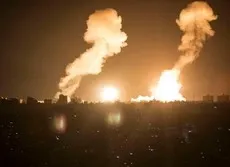Should Israel Cease Hostilities Against Iran?

Synopsis
Key Takeaways
- Twenty-one Arab, Islamic, and African nations call for an end to Israeli hostilities.
- Concerns about regional stability due to escalating tensions.
- Emphasis on peaceful dispute resolution and respect for sovereignty.
- Call for a nuclear-free Middle East.
- Iran's military retaliation highlights the seriousness of the situation.
Cairo, June 17 (NationPress) In a unified voice, twenty-one Arab, Islamic, and African nations have released a statement demanding an end to the Israeli aggression against Iran, advocating for a comprehensive ceasefire and the restoration of peace.
This statement, endorsed by foreign ministers from Egypt, Saudi Arabia, Qatar, Pakistan, Turkey, Chad, and others, reflects grave concerns regarding the recent escalation of Israeli military actions against Iran, which began on Friday. They warned that this situation could severely disrupt regional peace and stability, according to Xinhua news agency.
The ministers condemned Israel for breaching international law and the UN Charter, emphasizing the importance of respecting state sovereignty and territorial integrity, fostering good-neighborly relations, and resolving disputes through peaceful means.
They highlighted the pressing need to create a Middle East free of nuclear arms and other mass destruction weapons, urging all regional nations to join the Treaty on the Non-Proliferation of Nuclear Weapons. They also called for a return to negotiations as the only viable pathway towards a sustainable resolution of Iran's nuclear program.
Since Friday morning, Israel has conducted airstrikes on Tehran and various locations in Iran, resulting in the deaths of several high-ranking military leaders, nuclear experts, and civilians. In retaliation, Iran has executed a series of missile and drone strikes targeting Israel, leading to casualties and substantial destruction.








